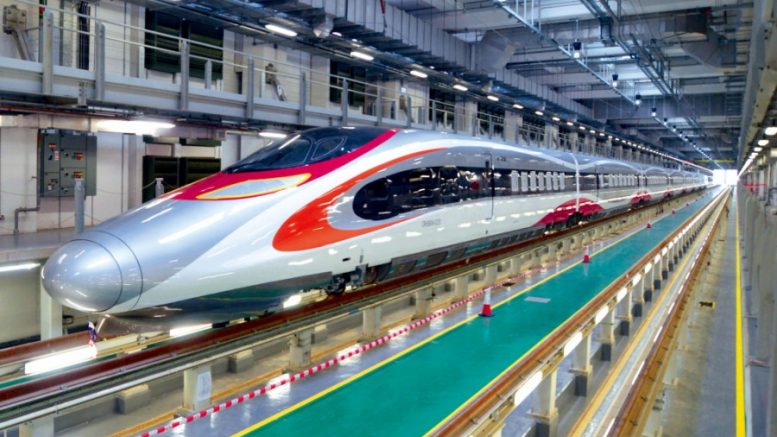By Chris Yeung –
It is a case of “one checkpoint model, two different worlds” with the Government and loyalists claiming the joint checkpoint arrangement at the West Kowloon rail terminus will be the fast lane to heaven and the opponents warning it is a path to hell. Truth is feared to be the victim in the fiercely-fought propaganda war between the two sides.
The two poles-apart scenarios have emerged as the battle-lines over the co-location of checkpoints plan at the West Kowloon terminus of the cross-border high-speed rail were drawn as soon as it was unveiled last week.
On Sunday, Chief Secretary Matthew Cheung Kin-chung has inflated the significance of the cross-border rail link. He said rail link’s checkpoint arrangement hinged upon the city’s long-term competitiveness.
Not just tourism and its related sectors, he argued that a list of the city’s pillar industries including finance, trade, logistics and professional services would all benefit from speedier and more convenient transport across the border.
According to government estimate, the trip from Hong Kong to Guangzhou on a high-speed train will take 48 minutes, less than half of the present ride on through-train.
Without the cross-border speed rail link, Cheung warned the city risks being marginalised.
Speaking also on Sunday, a key adviser to Chinese government, Anthony Wu Ting-yuk, issued another no-nonsense warning. He was worried that Hong Kong would be in decline becoming “China’s Venice”, which was once a booming trade centre in Europe, if the joint checkpoint arrangement was not in place at the high-speed rail link. Wu is a member of the Chinese People’s Political Consultative Conference Standing Committee.
Alarmist rhetoric by both sides
The alarmist rhetoric of top officials and pro-establishment figures sounds ironical as it came on the same day Chief Executive Carrie Lam Cheng Yuet-ngor blasted remarks by some critics of the checkpoint plan as “politicised,” “incomprehensive”, “rather ridiculous.”
Without naming names, she expressed disbelief to remarks made by a senior legal figure, who urged people not to get near to the West Kowloon terminus if they did not want to be arrested and sent to the mainland for a trial in mainland courts.
Her advice to people who feel worried about their personal safety at the West Kowloon terminus is simple. Just not take it. Go to the mainland by other means if they want to, said Mrs Lam.
Mrs Lam, whose popularity rose since she won the Chief Executive election in March, and her team seem to be determined to talk what they deem as the hard and naked truth in the battle for public support over the joint checkpoint arrangement.
Apart from her “take-it-or-drop-it” advice to the doubters of the checkpoint plan, justice minister Rimsky Yuen Kwok-keung made an uncaring analogy about the leasing arrangement for mainland authorities to enforce law at the West Kowloon terminus.
Yuen cited Basic Law Article 7 to say Hong Kong’s land resources belong to the nation. He likened the leasing deal to the return of land rent by landlord to tenants back to the landlord after the latter found he or she did not have enough land and wanted to have it back.
The blitz of insensitive remarks by the Lam team has inflamed the feeling of anxieties and uncertainties among the populace about the scenarios of letting the mainland authorities enforce mainland laws in the leased area at the terminus.
Not surprisingly, the pan-democratic camp has played the “communist-phobia” card, portraying a gloomy picture of Hong Kong if the joint checkpoint arrangement is turned into law.
They likened the move by the Government to “lease” land to the mainland authorities as “self-castration”, meaning a surrender of the city’s autonomy entitled to in the Basic Law.
The truth of the implications of the checkpoint model, however, lies between the sharply different scenarios envisaged by the proponents and opponents.
Joint checkpoint arrangement is perhaps the best in terms of economic effectiveness of the rail link. It is not the only path to Rome. Nor it has no demerits and risks.
Dismissing people’s jitters about the law enforcement of mainland authorities on Hong Kong soil as merely scaremongering could be counter-productive, breeding more fears and half-truths and further widening the gulf between the two sides.
Chris Yeung, Chief Writer of newly-launched CitizenNews, is founder and editor of the Voice of Hong Kong website. He is a veteran journalist formerly worked with the South China Morning Post and the Hong Kong Economic Journal. He writes on Greater China issues.
Photo: MTRC picture
This article also appears on CitizenNews.


Be the first to comment on "Truth the victim in rail propaganda war"